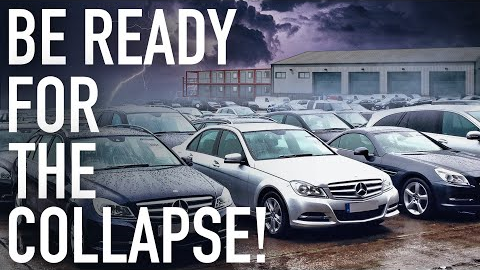People Will Freak Out When Car Prices Collapse 60% From Current Levels
111,791 View
Share this Video
- Publish Date:
- March 8, 2023
- Category:
- Home Remodeling Trends
- Video License
- Standard License
- Imported From:
- Youtube
Tags

The U.S. car price bubble has burst, and according to Bloomberg, fear of an impending collapse is gripping the auto industry because demand is rapidly disappearing due to the impact of soaring interest rates on auto loan costs. This time around, not even the electric vehicle market is going to be immune. Believe it or not, right now Tesla prices are $5,000 cheaper than the average U.S. car, and leading industry experts are telling manufacturers, dealers, and lenders to brace for some huge price crashes in 2023 as unsold inventory starts to pile up. But if you think that means you’ll just be able to go out there and get yourself a brand-new vehicle at super cheap costs, we’re sorry to break it to you, but that won’t be the case for the foreseeable future. Affordability issues are likely to persist throughout the year, and in today’s video, we will tell you why.
The value of new and used cars is about to come crashing down after two years of record highs, according to big names in the auto industry. After skyrocketing almost 80% from 2019 levels, used car prices are sliding at the fastest pace since 2011, data from AutoLenders shows. New car prices are seeing more modest declines, but they’re still significant after years of robust price growth.
Automakers are reporting more supplies of the chips they need, and manufacturing is finally recovering. This has certainly taken a toll on the used car market, which has already seen a 15% price crash so far this year, according to the Manheim price index, marking the biggest-ever year-over-year decline since the firm began tracking this data.
The damage is spreading to the electric-vehicle market. Believe it or not, today, Tesla’s Model 3 sedan now sells for US$4,930 less than the average new vehicle sold in the U.S. That’s the cheapest price Tesla has ever had relative to the typical U.S. vehicle, Bloomberg reports. It’s a similar story for Tesla’s more expensive Model Y sport utility vehicle, which started off the year with a staggering $13,000 price crash.
Executives are starting to sound the alarm about the impact double-digit drops of 40, 50, and even 60% could have on manufacturers' and lenders' bottom lines in 2023. “If that fear is realized and prices plummet, it will be detrimental to automakers and their in-house lending units, which likely will have to write down the value of lease contracts that had assumed vehicles would retain greater value,” the report highlighted.
And even though everyone is expecting the moment when car prices get back to down-to-earth levels again, the ongoing price drops actually have a negative effect on car buyers by reducing the value of the vehicle they hope to trade in. Cox shows that the average trade-in value in January was down nearly $3,000, or 11%, to $22,605, from the record high hit in June of 2022. That drop in the value of trade-ins could also be a headwind on car prices by reducing what buyers are able to pay.
At the same time, we still have nearly 17 million car owners that own vastly overpriced used vehicles. More than half of these cars are financed, potentially resulting in many car owners with car loans that are or will be underwater very soon. According to Moody's, some 9.3% of auto loans extended to people with low credit scores are at least 30 days late, the highest rate since 2010, the WSJ reports. The truth is that the auto loan crisis is a ticking time bomb that threatens to explode, unleashing economic devastation on a scale not seen since the Great Recession.
Did you miss our previous article...
https://trendinginrealestate.com/home-remodeling-trends/dreams-to-reality-in-real-estate-pashto-dvc-wirasatcom














